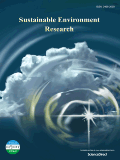
Sustainable Environment Research
Scope & Guideline
Empowering global change with cutting-edge environmental science.
Introduction
Aims and Scopes
- Sustainable Waste Management:
Research on the effective management and valorization of waste materials, including recycling, resource recovery, and waste-to-energy processes. - Pollution Control and Remediation:
Studies focused on the development and application of technologies for the treatment and removal of pollutants from air, water, and soil. - Renewable Energy and Resource Efficiency:
Exploration of renewable energy solutions and resource-efficient practices that contribute to reducing environmental impacts and promoting sustainability. - Life Cycle Assessment and Sustainable Practices:
Use of life cycle assessment (LCA) methodologies to evaluate the environmental impacts of products and processes, facilitating sustainable decision-making. - Climate Change Mitigation and Adaptation:
Research addressing strategies for mitigating climate change effects and adapting to changing environmental conditions. - Ecological and Environmental Health:
Investigations into the relationships between environmental factors and human health, including risk assessments and pollution exposure studies.
Trending and Emerging
- Advanced Materials for Environmental Applications:
There is a growing emphasis on the development and application of advanced materials, such as nanomaterials and composites, for environmental remediation and pollution control. - Circular Economy Practices:
Research focusing on circular economy principles, including waste valorization and sustainable resource management, has gained traction as part of broader sustainability efforts. - Technological Innovations in Wastewater Treatment:
Emerging themes include innovative technologies for wastewater treatment, such as hybrid systems and advanced oxidation processes, which are becoming increasingly important in addressing water quality issues. - Impact of Climate Change on Environmental Health:
Studies assessing the implications of climate change on ecological and human health have become more prominent, highlighting the urgent need for adaptation strategies. - Data-Driven Environmental Management:
The use of machine learning and big data analytics in environmental research is on the rise, indicating a trend towards data-driven approaches for better decision-making and policy formulation.
Declining or Waning
- Traditional Pollution Sources:
Research surrounding conventional pollution sources, such as industrial effluents, has seen a reduction, possibly due to the increasing focus on emerging pollutants and innovative treatment technologies. - Single-Method Approaches to Environmental Issues:
There has been a noticeable decline in studies solely relying on traditional, single-method approaches for environmental assessments, with a shift towards more integrative and multidisciplinary methodologies. - Localized Case Studies:
The emphasis on localized case studies has waned, as the journal increasingly favors broader analyses and comparative studies that can provide insights applicable across different contexts.
Similar Journals
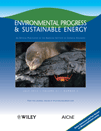
Environmental Progress & Sustainable Energy
Pioneering a path to sustainable energy solutions.Environmental Progress & Sustainable Energy, published by WILEY, is an influential journal dedicated to the crucial fields of environmental science and sustainable energy. Since its inception in 2009, this journal has consistently aimed to advance knowledge and understanding of innovative approaches and technologies that promote sustainability across various sectors. With an impact factor reflective of its strong academic contributions, the journal is catapulted into Q2 and Q3 quartiles across multiple categories, including Chemical Engineering and Environmental Science, demonstrating its central role in the dialogue surrounding pressing environmental issues. Researchers and professionals can access its cutting-edge studies through both traditional and open access options, facilitating the dissemination of knowledge globally. Addressed to an array of stakeholders from academia and industry alike, Environmental Progress & Sustainable Energy is not only a repository of research but also a platform for transformative ideas that aim to pave the way for a more sustainable future, making it an essential resource for those committed to the interplay of environmental stewardship and energy innovation.
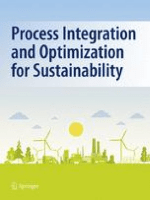
Process Integration and Optimization for Sustainability
Pioneering Research for a Sustainable PlanetProcess Integration and Optimization for Sustainability is an esteemed journal, published by SPRINGERNATURE, dedicated to advancing knowledge in the realms of chemical engineering, environmental science, and sustainable development. Established in 2017, this journal provides a platform for rigorous research that addresses the critical challenges of integrating and optimizing processes to achieve sustainability goals. With a commendable Q2 category ranking across various disciplines such as Chemical Engineering, Control and Systems Engineering, and Geography, along with impressive Scopus rankings, it has quickly established itself as a vital resource for researchers, professionals, and students. The journal's focus on innovative solutions for pollution control, renewable energy, and effective waste management aligns with global sustainability objectives. For academics seeking to publish their findings or stay abreast of the latest advances in these areas, Process Integration and Optimization for Sustainability is an indispensable resource that promises to foster impactful discussions and disseminate vital knowledge within the academic community.

Results in Engineering
Connecting Global Minds in Engineering Research and InnovationResults in Engineering is an esteemed open-access journal published by Elsevier, dedicated to advancing the field of engineering through high-quality, innovative research. Since its inception in 2019, this journal has rapidly established itself within the academic community, evidenced by its prestigious Q1 ranking in the Engineering (miscellaneous) category for 2023 and a remarkable ranking of #54 out of 307 in General Engineering according to the Scopus database, placing it in the 82nd percentile of its category. Located in the Netherlands, Results in Engineering provides a global platform for researchers, professionals, and students to disseminate their findings and foster collaboration across diverse engineering disciplines. The journal's commitment to open access ensures that valuable research is accessible to a wider audience, fostering innovation and knowledge sharing. With a progressive approach to publication, Results in Engineering seeks to enhance the engineering landscape by publishing cutting-edge studies that address contemporary challenges and solutions in the field.

Journal of Agricultural Machinery
Advancing Agricultural Innovation Through Machinery ResearchJournal of Agricultural Machinery, published by FERDOWSI UNIVERSITY MASHHAD PRESS, is a premier Open Access journal that has been serving the agricultural engineering community since 2011. This journal is dedicated to disseminating cutting-edge research, innovative practices, and technological advancements related to agricultural machinery. With an ISSN of 2228-6829 and an E-ISSN of 2423-3943, it provides a vital platform for researchers and professionals in the field to share their findings and insights. The journal, based in Iran at the Ferdowsi University of Mashhad, aims to bridge gaps between research and application, enhancing productivity in agriculture through improved machinery and methodologies. Despite its current Scopus ranking at the lower end of the spectrum, the journal is committed to elevating its impact and expanding its scope, focusing on innovative solutions that address pressing challenges in agricultural practices. As an Open Access resource, it ensures unrestricted availability to scholarly articles, fostering a collaborative environment for growth and learning among researchers, professionals, and students alike.

Rocznik Ochrona Srodowiska
Advancing Environmental Science for a Sustainable FutureRocznik Ochrona Srodowiska, published by the Middle Pomeranian Scientific Society for Environmental Protection, is an esteemed journal dedicated to advancing the field of environmental science in Poland and beyond. With an ISSN of 1506-218X, this peer-reviewed journal has established itself as a vital resource since its inception in 2007, addressing various environmental issues and promoting sustainable practices. Currently holding a Q3 category ranking in the Environmental Science (miscellaneous) field for 2023, it places itself in the 23rd percentile of Scopus rankings, reflecting a growing influence in the broader environmental research community. While the journal is not open access, it serves as an important conduit for researchers, professionals, and students to disseminate their findings and contribute to the interdisciplinary dialogue aimed at tackling pressing environmental challenges. With a commitment to rigorous research and practical applications, Rocznik Ochrona Srodowiska remains an essential platform for fostering innovation and collaboration in environmental studies.
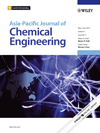
Asia-Pacific Journal of Chemical Engineering
Shaping Tomorrow's Innovations in the Asia-Pacific Region.The Asia-Pacific Journal of Chemical Engineering, published by WILEY, serves as a vital forum for the dissemination of innovative research in the interdisciplinary domains of chemical engineering, renewable energy, sustainability, and waste management. Established in 2006, this esteemed journal has achieved a notable impact factor that reflects its commitment to advancing knowledge and practices within the chemical engineering community. With its Q3 category rankings across various fields, including Chemical Engineering (Miscellaneous), Renewable Energy, Sustainability and the Environment, and Waste Management and Disposal, the journal holds a significant position among its peers, assuring readers of quality and relevance in published content. Although it does not offer Open Access options, the Asia-Pacific Journal of Chemical Engineering remains an essential resource for researchers, professionals, and students aiming to stay at the forefront of innovations affecting the Asia-Pacific region and beyond. The journal's broad scope covers diverse topics, making it an integral part of the academic landscape from 2006 to 2024.
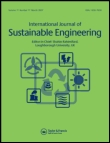
International Journal of Sustainable Engineering
Exploring the intersection of engineering and sustainability.Welcome to the International Journal of Sustainable Engineering, an esteemed publication within the field of engineering, dedicated to advancing the principles of sustainability in design and technology. Published by Taylor & Francis Ltd, this Open Access journal, available since 2022, provides a platform for high-quality research that addresses the challenges of sustainable engineering across diverse sectors. Based in the United Kingdom, the journal enjoys a distinguished reputation, reflected in its impressive Q1 status in the Engineering (miscellaneous) category and a notable Scopus rank of #35 out of 307, placing it in the top 88th percentile of its field. With a timeline of publications from 2008 to 2024, the International Journal of Sustainable Engineering serves as a vital resource for researchers, professionals, and students seeking to engage with innovative solutions that promote sustainability in engineering practices. We invite you to contribute to this critical discourse and explore the wealth of knowledge presented in our journal.
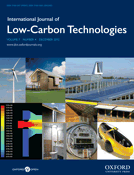
International Journal of Low-Carbon Technologies
Transforming research into impactful environmental action.International Journal of Low-Carbon Technologies is a premier, peer-reviewed publication dedicated to advancing the field of low-carbon technologies and sustainable practices. Published by OXFORD UNIVERSITY PRESS, this journal serves as a vital resource for researchers, professionals, and students alike, providing insightful research and innovative solutions for a sustainable future. With its ISSN 1748-1317 and E-ISSN 1748-1325, the journal is recognized globally, boasting an impressive impact in its categories, including a Q1 ranking in Architecture and Q2 rankings in both Civil and Structural Engineering and Environmental Science as of 2023. It is open access since 2014, facilitating the dissemination of knowledge to a wider audience, and encourages critical discourse on environmental sustainability across converging disciplines. The journal’s Scopus rankings reflecting its standing—ranked #23 in Architecture (88th percentile) and #130 in Civil and Structural Engineering—underscore its importance in driving forward the scientific agenda in low-carbon technologies. As we journey from 2007 towards 2024, the International Journal of Low-Carbon Technologies remains a cornerstone for research and dialogue in reducing carbon footprints and promoting resilient infrastructure.
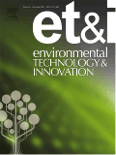
Environmental Technology & Innovation
Exploring Breakthroughs in Environmental SustainabilityEnvironmental Technology & Innovation is a leading academic journal published by Elsevier, focusing on groundbreaking research and advancements in the fields of Environmental Science, Plant Science, and Soil Science. Since its inception in 2014, this prestigious journal has established itself in the top Q1 quartiles of its categories, reflecting its commitment to publishing high-quality, impactful research. As evidenced by its impressive Scopus ranks, including a rank of #14/516 for Plant Science and #5/159 for Soil Science, it serves as a vital resource for scholars, researchers, and professionals aiming to advance their understanding and innovation in environmental technologies. Although it operates under a subscription model, the journal provides significant insights and access options, making it an essential addition to any researcher's library. With its emphasis on sustainability and technological advancements, Environmental Technology & Innovation remains at the forefront of addressing global environmental challenges and fostering innovative solutions.
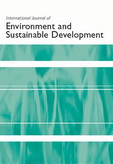
International Journal of Environment and Sustainable Development
Transforming ideas into action for global sustainability.The International Journal of Environment and Sustainable Development, published by INDERSCIENCE ENTERPRISES LTD, serves as a vital platform for researchers, practitioners, and policymakers engaged in the multidisciplinary fields of geography, renewable energy, and environmental sustainability. With an ISSN of 1474-6778 and an E-ISSN of 1478-7466, this journal has been disseminating critical research since its inception in 2002 and continues to expand its scope through 2024. Recognized within the Q3 quartile in Geography, Planning and Development and Q4 in both Management, Monitoring, Policy and Law and Renewable Energy, Sustainability and the Environment, it provides valuable insights into contemporary issues affecting our planet. While access options are limited to non-open access formats, the journal remains essential for those seeking to enhance their understanding of sustainable development practices and policies in a global context. The International Journal of Environment and Sustainable Development is not only an academic repository but also a catalyst for dialogue and innovation within the environmental sciences.